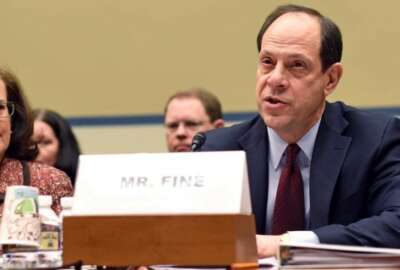Senators seek ‘guardrails’ on expanded subpoena power for inspectors general
Agency inspectors general are getting closer to gaining the authority to question former federal employees and contractors as part of their investigations.
Agency inspectors general are getting closer to gaining the authority to question former federal employees and contractors as part of their investigations.
But leading voices from the IG community told members of the Senate Homeland Security and Governmental Affairs Committee Thursday that they would use testimonial subpoena authority sparingly, and that IGs would have to go through several channels in order to prevent abuse.
The committee expects to vote on several IG reform bills next week, including the bipartisan IG Independence and Empowerment Act and the IG Testimonial Subpoena Authority Act.
Among the major provisions, the bills would give IGs the authority to subpoena former federal officials and contractors — a tool agency watchdogs have requested from Congress for years.
However, Committee Ranking Member Rob Portman (R-Ohio) and several other Republican members of the committee, fearing abuse of this new authority, have urged setting up guardrails for IGs to issue testimonial subpoenas.
The bills the committee will consider would also require the president to give Congress a more detailed explanation for removing an IG, and would limit the president to naming an acting IG from a pool of senior-level employees from within the watchdog community.
Committee Chairman Gary Peters (D-Mich.) said the bills mark the biggest attempt to reform the authority of agency IGs in more than 13 years, and would address recent scenarios where IGs have been vulnerable to political influence.
“We must ensure that no administration is able to undercut the independent transparency and accountability that inspectors general provide to the American people,” Peters said.
Allison Lerner, the National Science Foundation’s IG and chairwoman of the Council of the Inspectors General on Integrity and Efficiency (CIGIE), said the testimonial subpoena authority the IG community has asked from Congress since 2015 would serve as an “essential tool” to conduct investigations.
“The fact that we cannot require these interviews undermines our ability to complete investigations and hold individuals accountable for their misconduct, thereby diminishing the public’s trust in government,” Lerner said.
Justice Department IG Michael Horowitz, also chairman of the Pandemic Response Accountability Committee (PRAC), said testimonial subpoena authority would have helped his office in high-profile investigations, such as his office’s work into the FBI’s handling of allegations against USA Gymnastics and former team doctor Larry Nassar.
But he said this authority would also help his office question federal employees who leave government before an investigation runs its course.
“We’ve had occasions where people have resigned a few hours before a compelled interview, precisely because they want to avoid speaking to us,” Horowitz said.
Horowitz said in recent years, a former senior FBI official wouldn’t speak to the IG’s office regarding alleged retaliation, and a contractor refused to speak with the OIG regarding a whistleblower complaint.
“I can compel a DOJ employee, I can’t compel one of their contractors, and if they leave the contractor, it’s even harder to get that person to agree to speak with us,” he said.
Kevin Winters, Amtrak’s IG and chairman of CIGIE’s Integrity Committee, said the committee could also use testimonial subpoena authority to investigate IGs or OIG personnel who leave government pending an investigation into alleged wrongdoing.
“If they refuse to testify or to answer our calls, then our investigations are somewhat pointless,” Winters said.
Portman said members have considered limiting the scope of testimonial subpoena authority to about five-to-six years, rather than authorize this new authority indefinitely.
“We put guardrails in place for a reason, because we think this is a power that could be abused. We want to make sure it’s not,” Portman said.
Lerner said IG offices already have a rigorous process for issuing a subpoena compelling agency leadership to turn over documents.
“In my office, for a documentary subpoena to be issued, there are six sets of eyes that go on it – three investigators, two attorneys, and then me. Our focus and attention have added a great deal of value there,” Lerner said.
Rather than sunset the authority, Lerner urged lawmakers to consider having CIGE or the Government Accountability Office review whether or not to reauthorize administrative subpoena authority.
If Congress insisted on limiting the scope of this authority, she urged giving the IG community at least 10 years to use this authority before allowing it to sunset.
“It’s taken us 10 years with congressional support to get this far, and we’re worried that we could, with a hard-and-fast sunset, lose that authority and have great difficulty getting it reauthorized,” Lerner said.
The Defense Department Office of Inspector General has had testimonial subpoena authority since 2009, but only used this authority to issue three subpoenas.
Horowitz said the DoD IG office has been able to reach accommodations with witnesses in most cases, rather than escalate the matter to issuing a subpoena.
“Before an IG signs a subpoena for testimony, they engage counsel, or the witness themselves, to understand what the concerns are, if there are any issues with testimony. Frankly, we do that with the voluntary arena, when we’re trying to get people to speak to us voluntarily,” Horowitz said.
Lerner said subpoena authority would have proven useful for a previous investigation into a small business contractor that allegedly falsified timesheets.
“We had the documentary evidence, but we weren’t able to engage with the people that could give us greater insights and take that case to closure. It’s extremely demoralizing for our investigative staff in those matters. There are so many benefits that would come from this authority,” Lerner said.
Winters said CIGIE’s Integrity Committee could also investigate IGs for abuse of authority if they improperly use testimonial subpoena authority.
“There should be safeguards. It shouldn’t be something we just run around and are able to use,” Horowitz said.
The bill would create a three-member panel of IGs to review subpoena requests. Agency IGs would also need support from the Justice Department’s Civil Division to enforce the subpoena if the recipient doesn’t comply.
Subpoena recipients would also have the option of contesting that subpoena in court.
Copyright © 2025 Federal News Network. All rights reserved. This website is not intended for users located within the European Economic Area.
Jory Heckman is a reporter at Federal News Network covering U.S. Postal Service, IRS, big data and technology issues.
Follow @jheckmanWFED






